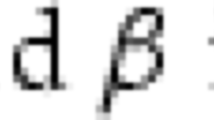Abstract
A very common twofold view in contemporary philosophy is that classical logic is the correct view of logical consequence and that possibility conforms to classical logic in the sense that ‘possible worlds’ — whatever else they may be — are closed under classical logic. These two views are assumed in this paper. My aim in this paper is to show that a very natural ‘paraconsistent’ (and also ‘paracomplete’) consequence relation is involved in the given view of possible worlds and logical consequence.
Similar content being viewed by others
Notes
The extension to first-order languages (and first-order logic) is straightforward but present purposes demand only the simpler propositional level. Exactly what makes vocabulary ‘logical’ is a hard question, and one on which I herein remain silent, except to assume the standard batch of vocabulary as logical. Gil Sagi’s work highlights some of the background difficulties Sagi (2017, 2018).
An alternative, briefly discussed in Section 5, is ‘egalitarian’ with respect to the roles of duo-point worlds.
Call a connective extensional iff its evaluation at a point never demands going beyond that point. (Example: typical modal connectives are not extensional.) The logical connectives canvassed here are extensional in just that sense, even if one needs to look at different components of a point to evaluate the connectives.
Those familiar with the Valerie Routley & Richard Routley ‘Star’ account of logical negation Routley and Routley (1972), some history and background to which is given by Dunn (2019), should note that the duo-points account has the feel of the Star account but is not the Star account. The Star account is not extensional (as understood above); it involves a shift of points whereas the duo-points account involves only an ‘internal shift’ (of sorts).
For a useful history of the given consequence relation see Mike Dunn’s account Dunn (2019), and for further history and discussion of FDE see the Omori–Wangsing collection Omori and Wansing (2019).
Concerning the metaphysical questions flagged in Section 2.3 above, note that the construction provides a natural way of understanding what Berto & Jago call ‘FDE worlds’ Berto and Jago (2013).
References
Asenjo, F. G. (1966). A calculus of antinomies. Notre Dame Journal of Formal Logic, 7(1), 103–105.
Beall, J., Logan, S. (2018) Logic: The Basics. Routledge: Oxford, Revised 2nd edition.
Belnap, N. D. (1977). How a computer should think. In G. Ryle (Ed.), Contemporary Aspects of Philosophy. Oriel Press.
Berto, F., & Jago, M. (2013). Impossible Worlds. Oxford: Oxford University Press.
Dunn, J. M. (2019). One, two, three, infinity: the path to four-valued logic and beyond. In H. Wansing & H. Omori (Eds.), New Essays on the Belnap-Dunn 4 valued Logic. Springer.
Jaśskowski, S.L. (1969) Propositional calculus for contradictory deductive systems. Studia Logica, 24:143–157. First published under the title ‘Rachunek zdańádla systemów dedukcyjnych sprzecznych’ in Studia Societatis Scientiarum Torunensis in 1948.
Kleene, S. C. (1952). Introduction to Metamathematics. North-Holland.
Omori, H., & Wansing, H. (2019). New Essays on Belnap-Dunn Logic. Berlin: Springer.
Priest, G. (1979). The logic of paradox. Journal of Philosophical Logic, 8, 219–241.
Priest, G. (2001). (2008) An Introduction to Non-Classical Logic. Cambridge University Press: Cambridge, second edition, First edition published in.
Restall, G. (1997). Ways things can’t be. Notre Dame Journal of Formal Logic, 38(4), 583–596.
Routley, V., Routley, R. (1972) Semantics of rst-degree entailment. Noûs, 3:335–359.
Sagi, G. (2017) Extensionality and logicality. Synthese, (pp. 1–25).
Sagi, G. (2018). Logicality and meaning. Review of Symbolic Logic, 11(1), 133–159.
van Fraassen, B. C. (1966). Singular terms, truth-value gaps, and free logic. Journal of Philosophy, 63, 481–495.
Varzi, A. (1999) An Essay in Universal Semantics, volume 1 of Topoi Library. Kluwer Academic Publishers, Boston.
Acknowledgements
Thanks to Franz Berto, A. J. Cotnoir, Franca D’Agostini, Michael DeVito, Elena Ficara, Daniel Nolan, Luis Estrada González, Graham Priest, Elisángela Ramírez, Greg Restall, Gill Russell, Kevin Scharp, Zach Weber and participants in a super-special seminar at St Andrews. Thanks especially to Nikolaj Pedersen for helpful feedback.
Author information
Authors and Affiliations
Corresponding author
Rights and permissions
About this article
Cite this article
Beall, J. From possible worlds to paraconsistency: on the inevitability of paraconsistent entailment. AJPH 1, 26 (2022). https://doi.org/10.1007/s44204-022-00028-0
Received:
Accepted:
Published:
DOI: https://doi.org/10.1007/s44204-022-00028-0



